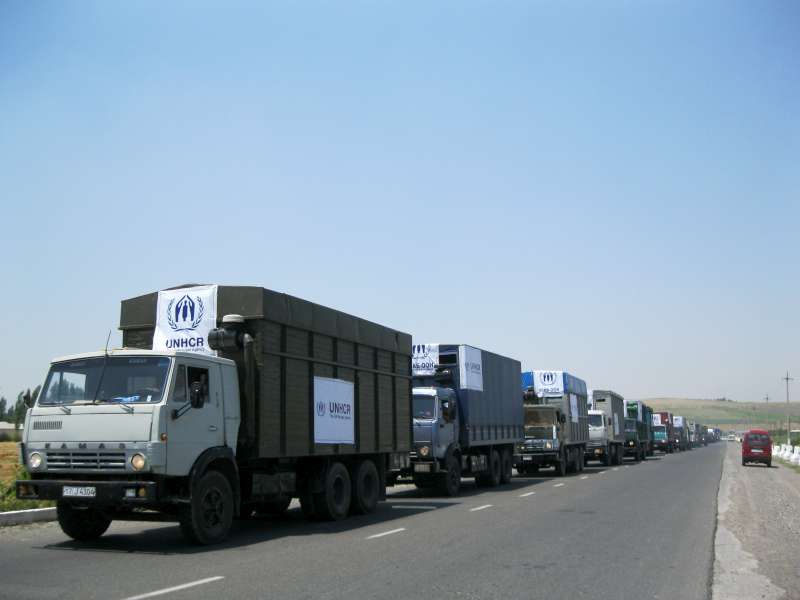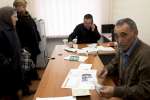UNHCR chief visits southern Kyrgyzstan, says further help needed
News Stories, 30 June 2010

© UNHCR/S.Grigoryan
A UNHCR relief convoy enters Kyrgyzstan at the border with Uzbekistan.
OSH, Kyrgyzstan, June 30 (UNHCR) – UN High Commissioner for Refugees António Guterres today visited southern Kyrgyzstan and appealed to the international community not to turn its attentions away from the tens of thousands of people still faced with having to rebuild lives and overcome trauma following the violence there in mid-June.
Speaking to journalists at a site for returned refugees and other displaced people in the town of Osh, Guterres spoke of the difficulties for those left homeless or living in fear of further unrest.
"The world was taken by surprise with Kyrgyzstan, we must not be taken by surprise again," he said. "Entire communities here have been left fractured and embittered. Immediate and sustained humanitarian help is needed to avert a dangerous expansion of grievance and loss."
Since mid June, and with some tens of thousands of people having been displaced inside Kyrgyzstan as well as across the border into Uzbekistan, UNHCR has rushed hundreds of tonnes of emergency relief into the two countries in a series of massive air shipments from Dubai.
With refugees having since returned to Kyrgyzstan the focus of help has now shifted to the displaced populations in and around Osh and nearby Jalalabad.
On Wednesday in Osh, High Commissioner Guterres received the first convoy of some 20 trucks at the Kyrgyz-Uzbek border carrying UN aid materials into Kyrgyzstan from Uzbekistan, where they are no longer needed.
Guterres has been visiting Kyrgyzstan to see for himself the conditions on the ground for the many thousands of people who have been displaced by the violence. As well as traveling to Osh on Wednesday he met government officials including President Roza Otunbayeva. On Thursday he's expected to visit other towns in the south.
Help UNHCR's relief efforts in Kyrgyzstan and Uzbekistan.
Advocacy is a key element in UNHCR activities to protect people of concern.
Filippo Grandi, who took office on January 1 2016, is the UN refugee agency's 11th High Commissioner.
Findings of surveys commissioned by UNHCR, Bishkek 2009.
The crisis in Kyrgyzstan
UNHCR was monitoring the returns of refugees and other displaced people to southern Kyrgyzstan as tens of thousands of people headed back to their communities. Violent clashes in Osh and other cities in southern Kyrgyzstan earlier this month had sent an estimated 300,000 fleeing to the countryside, while 100,000 had fled across the border into Uzbekistan.
Days after the attacks, Kyrgyz authorities were still trying to restore law and order in the south, where they reported that some 180 people were killed and 1,900 injured. Many of the internally displaced have been staying with host families with many also sleeping rough. In Uzbekistan, authorities reported more than 50 sites hosting refugees in the border provinces of Andijan, Ferghana and Namangan. Some refugees were staying in schools and other public buildings.
UNHCR has provided more than 300 tonnes of emergency assistance in a series of relief flights over the past week, working with the concerned governments and local partners in sometimes hazardous conditions.
The crisis in Kyrgyzstan
Statelessness in Kyrgyzstan
Two decades after the disintegration of the Soviet Union, thousands of people in former Soviet republics like Kyrgyzstan are still facing problems with citizenship. UNHCR has identified more than 20,000 stateless people in the Central Asian nation. These people are not considered as nationals under the laws of any country. While many in principle fall under the Kyrgyz citizenship law, they have not been confirmed as nationals under the existing procedures.
Most of the stateless people in Kyrgyzstan have lived there for many years, have close family links in the country and are culturally and socially well-integrated. But because they lack citizenship documents, these folk are often unable to do the things that most people take for granted, including registering a marriage or the birth of a child, travelling within Kyrgyzstan and overseas, receiving pensions or social allowances or owning property. The stateless are more vulnerable to economic hardship, prone to higher unemployment and do not enjoy full access to education and medical services.
Since independence in 1991, Kyrgyzstan has taken many positive steps to reduce and prevent statelessness. And UNHCR, under its statelessness mandate, has been assisting the country by providing advice on legislation and practices as well as giving technical assistance to those charged with solving citizenship problems. The refugee agency's NGO partners provide legal counselling to stateless people and assist them in their applications for citizenship.
However, statelessness in Kyrgyzstan is complex and thousands of people, mainly women and children, still face legal, administrative and financial hurdles when seeking to confirm or acquire citizenship. In 2009, with the encouragement of UNHCR, the government adopted a national action plan to prevent and reduce statelessness. In 2011, the refugee agency will help revise the plan and take concrete steps to implement it. A concerted effort by all stakeholders is needed so that statelessness does not become a lingering problem for future generations.
Statelessness in Kyrgyzstan
2015 UNHCR Nansen Refugee Award
UN High Commissioner for Refugees António Guterres presents the Nansen medal to Afghan refugee, Aqeela Asifi in Geneva, Switzerland.
Asifi, 49, has dedicated her life to bringing education to refugee girls in Pakistan. Despite minimal resources and significant cultural challenges, Asifi - a former teacher who fled from Kabul with her family in 1992 - has guided over a thousand refugee girls through primary education in the Kot Chandana refugee village in Mianwali, Pakistan.
Before she arrived, strict cultural traditions kept most girls at home. But she was determined to give these girls a chance and began teaching just a handful of pupils in a makeshift school tent.
UNHCR's Nansen Refugee Award honours extraordinary service to the forcibly displaced, and names Eleanor Roosevelt, Graça Machel and Luciano Pavarotti among its laureates. Speakers and performers at today's award ceremony include UNHCR Honorary Lifetime Goodwill Ambassador Barbara Hendricks, UNHCR Goodwill Ambassador Ger Duany, Unicef Goodwill Ambassador and singer Angelique Kidjo and visual artist Cedric Cassimo.
Afghanistan is the largest, most protracted refugee crisis in the world. Over 2.6 million Afghans currently live in exile and over half of them are children.
2015 UNHCR Nansen Refugee Award


Hopes, fears and the way forward
António Guterres, who served as UN High Commissioner for Refugees from June 2005 to December 2015, reflects on the dramatic acceleration of displacement around the world and calls for a surge in diplomacy for peace in an interview with his chief spokesperson, Melissa Fleming.


High Commissioner Guterres Remarks on the resettlement of Refugees from Bhutan in Nepal
The UN refugee agency and the International Organization for Migration (IOM) marked a major milestone: the resettlement of over 100,000 refugees from Bhutan in Nepal to third countries since the launch of the programme in 2007.


Turkey: World Refugee Day visits
On World Refugee Day the UNHCR High Commissioner, António Guterres, along with Special Envoy Angelina Jolie, travelled to southeastern Turkey, the home of hundreds of thousands of refugees from conflicts in Syria and Iraq. They were in the midyat refugee camp to see conditions for these people and to issue a warning to the world.
 |
|  |
|  |
| 








































